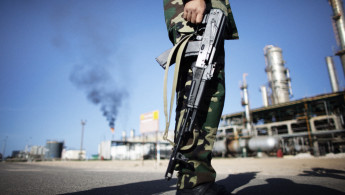Libyan authorities order detention of militia leader over killing of UN-sanctioned human trafficker
Libya’s chief prosecutor ordered the detention of a militia leader and one of his aides pending an investigation into the killing of one of the country’s most notorious human traffickers.
Mohamed Bahroun, commander of the First Support Battalion and an influential militia leader, as well as one of his associates, handed themselves over after allegations surfaced about their role in last week’s killing of Abdel-Rahman Milad in the capital, Tripoli.
The office of General Prosecutor al-Sediq al-Sour said in a statement late Saturday that prosecutors ordered both men to remain detained after they were interrogated and shown evidence of their involvement in Milad's slaying.
Milad, sanctioned by the United Nations Security Council and imprisoned in Libya on trafficking charges, was shot and killed on September 1 while in his vehicle in the Sayyad area, in the western part of Tripoli.
The late human trafficker and Bahroun hailed from the western town of Zawiya where Milad commanded a notorious coast guard unit. Both rose to prominence during the chaos after a NATO-backed uprising — that turned into civil war — toppled and killed longtime dictator Muammar Gaddafi in 2011.
The oil-rich nation has since then split between two administrations, each backed by armed groups and foreign governments. Both Milad and Bahroun held government positions in the lawless western part of the Mediterranean country.
Since then, Libya has emerged as a major conduit for people from Africa and the Middle East fleeing wars and poverty and hoping to reach Europe by crossing the Mediterranean Sea.
In June 2018, the Security Council imposed sanctions on Milad and five other leaders of criminal networks for their alleged engagement in trafficking migrants and others from Libya. At the time, Milad was described in a U.N. report as the head of a coast guard unit in Zawiya "that is consistently linked with violence against migrants and other human smugglers" from rival gangs.
U.N. experts monitoring sanctions claimed Milad and other coast guard members "are directly involved in the sinking of migrant boats" by opening fire to intercept the vessels.
The intercepted migrants are held in government-run detention centers rife with practices that amount to crimes against humanity, according to U.N.-commissioned investigators. The abuse often accompanies attempts to extort money from the families of the imprisoned migrants before releasing them or allowing them to leave Libya on traffickers’ boats to Europe.
Milad had denied any links to human smuggling and said traffickers wear uniforms similar to those of his men. He was jailed for about six months between October 2020 and April 2021 on human trafficking and fuel smuggling charges.




 Follow the Middle East's top stories in English at The New Arab on Google News
Follow the Middle East's top stories in English at The New Arab on Google News
![A group of Palestinians, foreign and Israeli activists gather to participated in an olive picking event on the land in the town of Battir, which is under threat of confiscation by Israel in Bethlehem, occupied West Bank on 8 November 2024. [Getty]](/sites/default/files/styles/image_330x185/public/2182930803.jpeg?h=199d8c1f&itok=__0LgGsa)

![People gathered around the rubble of destroyed houses to search for survivors [Getty]](/sites/default/files/styles/image_330x185/public/2024-11/GettyImages-2184733820.jpg?h=199d8c1f&itok=NiM1LO2f)